
views
- When you feel panicked, take deep breaths and reassure yourself. Sit in a quiet spot and use grounding exercises to clear your mind.
- Repeat a soothing mantra to yourself and challenge your unrealistic fears. Picture yourself somewhere happy and listen to calm music.
- Relax your muscles and go for a short walk. If you need outside help, talk to a friend or seek therapy, and ask a doctor about medication.
Reassure yourself that the panic will pass.

Anxiety attacks aren’t as scary when you know they’re only temporary. Severe panic is frightening for anyone, and it’s nothing to be ashamed of. When you feel intense anxiety, acknowledge the panic attack and remind yourself that no matter how you feel right now, it’ll go away soon. Even though they’re unpleasant, panic attacks are not dangerous to you. Everyone experiences panic attacks a little differently, but generally, an attack reaches peak intensity in about 10 minutes. They rarely last longer than an hour, and most symptoms will fade in 20 to 30 minutes. Simply knowing what panic attacks are and how they work can be a powerful tool! Though you may still experience anxiety, you don’t have to fear the attack itself—and you can recover faster.
Take deep, calming breaths.
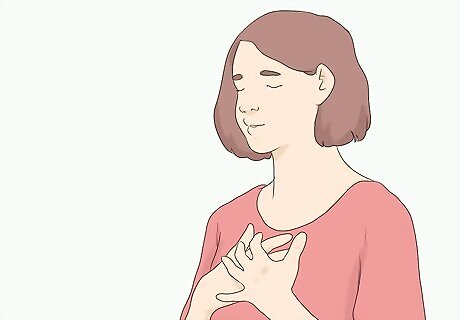
Deep breathing can help get the panic under control. When you feel panic coming on, pause and slow down your breathing. Take a deep, steady breath in through your nose while counting to 4, feeling the air fill your chest and belly. Hold your breath for 1 second and then exhale slowly through your mouth, again counting to 4. Repeat that for a couple of minutes until you feel calmer. Deep breaths can also help you stop or prevent hyperventilation, which is a common side effect of panic attacks. If you can, lie down or sit up straight with one hand on your belly and one on your chest. Feel your belly expand as you breathe in, then use your abdominal muscles to push the breath out slowly. Try to deliberately relax your tongue on the lower palette of your mouth as you exhale. This can help your body feel more relaxed.
Sit in a quiet spot.
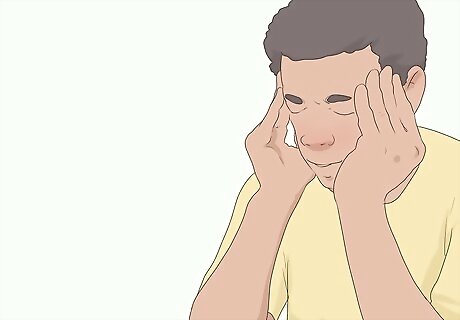
It’s easier to focus on calming down in quiet, secluded spaces. Sometimes, panic attacks are caused by overwhelming stimuli in your environment, like lights, noise, lots of people, or too much fast-paced energy. To shut out that stimuli and calm yourself, find a quiet and secluded spot where you can sit for a while and relax. Then, you can put your energy towards dealing with the panic. If you’re sensitive to light or other visual stimuli, it can also help to close your eyes for a couple of minutes while you focus on breathing.
Find an object to focus on.
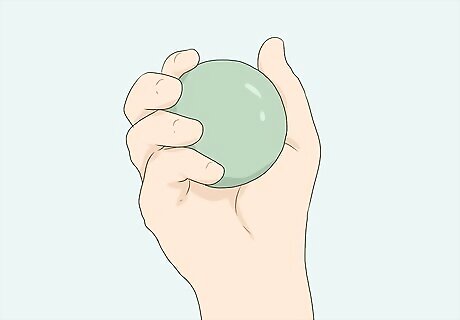
Focusing on one thing can stop you from being overwhelmed by stimuli. A simple grounding exercise is to simply find an object and put all your attention towards studying it for a few minutes. Once you pick an object, start thinking about its look: colors, shape, and texture. Who made it? How does it feel when you touch it? This exercise helps ground you in reality and pushes aside any stressors. Try holding a small object, such as a set of keys or a stress ball, and turning it over in your hand. Pay attention to the weight of it and how it feels against your fingers. If you have recurring panic attacks, be prepared! Carry around a familiar object in your bag or pocket that you can use, like a small gadget, a gemstone, or a keyring. You might also find it helpful to mentally review who you are and what you’re doing in the here and now. For example, say to yourself, "I’m Christine. I’m 22 years old, and I’m sitting in my living room. I just got home from work."
Use the “5-4-3-2-1” mindfulness exercise.
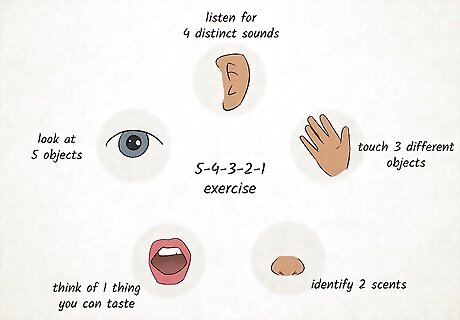
Being mindful and using your senses can ground you in the moment. During a panic attack, stop and concentrate on what you can feel, see, smell, hear, and taste in that moment. Panic attacks can be disorienting, but utilizing your senses in the “5-4-3-2-1” grounding exercise redirects your attention away from your stress and onto your surroundings. Do the following: Look at 5 objects. Think about each one for a little while: what it looks like, how it works, and why it’s there. Listen for 4 distinct sounds. Where do they come from? What makes them different from one another? Touch 3 different objects. Consider their texture and whether they’re hot or cold to the touch. Identify 2 scents. This could be the smell of your snack, your hand soap, or your perfume. Think of 1 thing you can taste. Identify a taste that’s already in your mouth, eat or drink something, or simply imagine a taste you like in your mouth.
Repeat a comforting mantra to yourself.

Mantras can be a source of strength to help you fight through the panic. Think of a word or phrase that you find soothing. It can be anything: a quote from your favorite movie, a reassuring affirmation that your panic attack will pass, or a spiritual phrase that resonates with you. When you have a panic attack, gently repeat the mantra to yourself as you get control over your breathing and emotions. Your mantra could be, “Even darkness must pass,” which is a quote from Lord of the Rings! You could make your mantra a mood or state of mind that you want to manifest, like, “I find calm within myself,” or “I’m okay, and I’m taking things one day at a time.”
Challenge and replace unrealistic thoughts.

Challenging your fears helps you stop obsessing over them. Often, panic attacks can occur when you start worrying about a problem, and just can’t stop. Your mind might start to catastrophize when it’s really not the end of the world! Identify your anxiety-producing thoughts and replace them with thoughts that are either happy and peaceful, or more realistic. Say you’re anxious about a plane flight and obsessing over the possibility of a crash. Ask yourself, “Am I really in danger?” The answer should be “no.” You could replace those negative thoughts with logic by saying, “It’s extremely unlikely that the plane will crash. Flying is one of the safest forms of travel. Statistically, it’s much safer than cars or trains.” If you respond better to positivity, try replacing those fears with a happy thought—like how excited you are to go on this trip with your friends, and how much fun it’s going to be!
Picture yourself in your happy place.
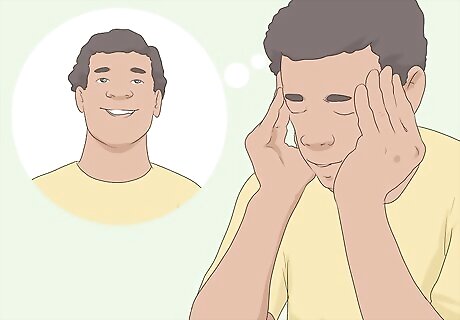
Picturing your happy place will make you feel more relaxed and calm. When you feel anxiety coming on, visualize yourself in a place where you feel at peace and relaxed. This could be your home, a favorite vacation spot, or in the arms of a loved one. Think about what you can see, smell, touch, hear, and taste, and keep adding sensory details to create the most vivid scene possible. Feel free to do this with your eyes closed or open, although closing your eyes may make the process easier. Try going to your happy place right as you feel your anxiety coming on, and practice breathing and relaxation exercises there. Once you feel more relaxed, you can leave the visualization.
Smell lavender essential oil.

Lavender is a common natural remedy for stress and anxiety. Invest in an essential oil diffuser, or purchase lavender essential oil and dab a drop onto a piece of cloth before smelling it. You could also purchase a product with diluted essential oil in it, like lavender lotion, and breathe in the scent that way. Lavender has a soothing scent, and you can use it as part of your grounding exercises. If you don’t like the scent of lavender, pick up another soothing essential oil like chamomile, bergamot orange, or jasmine.
Practice muscle relaxation techniques.
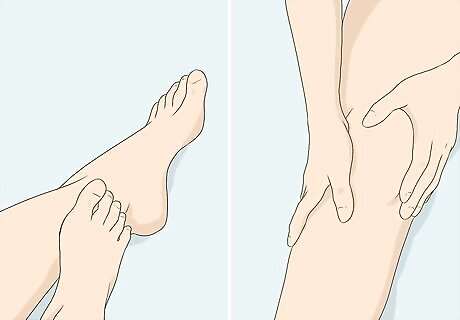
Relaxing your muscles can cut an anxiety attack short. Slowly go through your body, tensing each muscle group for 5 to 10 seconds, then releasing the pressure. Start with the muscles in your face, and then work your way down until you’ve relaxed every muscle. This forces you to concentrate on something other than your fear while simultaneously helping you relax your muscles. Major muscle groups that you can tense and relax include your jaw, mouth (going from a frown to a relaxed state), arms, hands, stomach, buttocks, thighs, calves, and feet. Relaxing your muscles can also trick your mind; once it senses that your body is relaxing, other symptoms (like rapid breathing) will start to fade. You can tense and relax the same muscle group multiple times, but doing it once should work just as well.
Write down your feelings.

Writing your feelings makes them more manageable. If you’re prone to panic attacks or anxiety, keep a diary where you can write entries explaining your emotions. Write what you feel, what you’re afraid of, your beliefs and thoughts about the fear, and how intense the experience is. Writing will help you to focus your thoughts, and reading your entry later can help you handle your anxiety better. If it feels like you don’t have anything to say, keep analyzing situations that trigger your anxiety. Slow down and think about the situations so you can pick out emotions that may have boosted your anxiety. Practice self-compassion as you write your entries and avoid judging yourself or your thoughts. Remember: you can’t control your feelings; you can only control your reactions to them.
Listen to relaxing music.
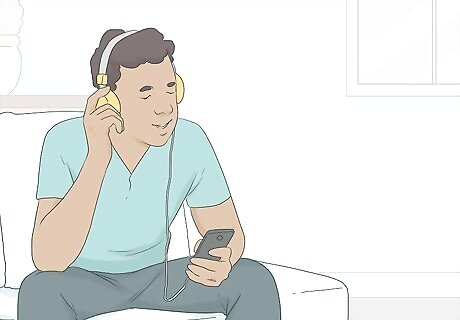
Calming music can refocus your mind and make you feel happy. Use music therapy to relax by creating a playlist of songs you enjoy and find relaxing. During panic attacks, listen to the music and focus on the different parts that are being played, the sound, and the lyrics if there are any. This will help to focus your mind away from your fear. Try to listen to music with slow beats (about 60 beats per minute) and relaxing lyrics (or no lyrics at all). Music with faster beats or angry lyrics may stress you out further. Use noise-cancelling headphones when possible, as they help you concentrate on the music and muffle outside stimuli.
Do some gentle exercise.

Exercise relaxes your body in the moment and prevents panic long-term. When you have a panic attack, take a short walk. As you move your body, it’ll release endorphins, which are hormones that boost your mood and relax your body. Walking can also help you control your breathing—and it gives you an excuse to leave a stressful location, if applicable. You don’t have to walk if there’s another form of moderate exercise you prefer. You could always do some yoga, or go biking, or go swimming (if you have the opportunity).
Talk to someone about your anxiety.
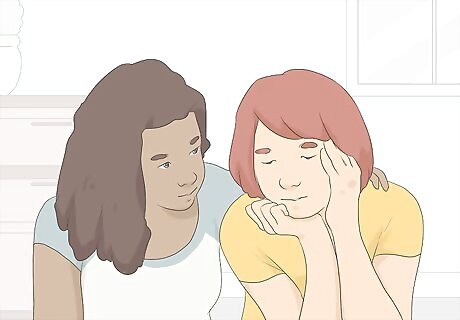
A confidante can offer you support as you work through anxiety attacks. If you’re in the throes of anxiety and can’t seem to get out, call a friend or family member for help. Have them distract you from your panic and talk through your fear so you can overcome the stress. If you’re prone to panic attacks, teach a friend how to treat them so that they’re prepared when you need help. For example, you could ask your friend to hold your hand during a panic attack and reassure you that what you’re feeling isn’t dangerous or permanent. Consider therapy as well. A mental health professional can give you tools for managing anxiety and a safe space to discuss your fears. Therapy prevents more panic attacks in the long term!
Ask your doctor about medication.

A fast-acting medication relieves panic attacks in minutes. Sometimes, your doctor or psychiatrist might prescribe an anxiety-controlling medication if other treatments and coping techniques aren’t helping enough. Medications with benzodiazepine or beta-blockers work quickly to reduce your physical symptoms, like rapid heartbeat and high blood pressure. Your doctor can analyze your symptoms and find the best medication for you. Benzodiazepines for panic attacks include Xanax and Valium, while Propranolol is a popular beta-blocker that aids relaxation. In some cases, your doctor might also prescribe a selective serotonin reuptake inhibitor (SSRI) medication like Lexapro or Prozac, which are anti-depressants that prevent panic attacks long-term.
Identify your triggers.
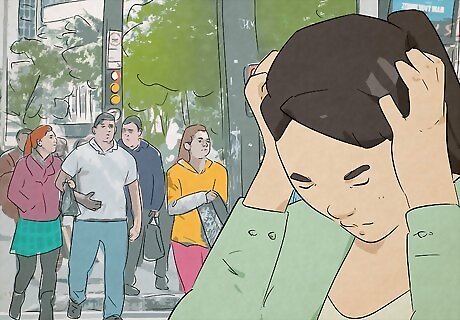
By learning your triggers, you’ll reduce the severity of an anxiety attack. Often, panic attacks are caused by something specific that causes you stress or fear. Think about the circumstances of your panic attacks: is there a place, person, or issue that sets them off? Learn your triggers and do your best to either avoid them in your daily life, or handle your triggers while doing something stressful. For example, you might realize that your panic attacks only occur in large crowds, or when you’re talking to a particular family member who says things that upset you. After identifying the root cause, you could avoid places with large crowds, or resolve not to spend time alone with the family member who triggers your anxiety, reducing the number of panic attacks you have. If you do something you know might cause a panic attack, you could take time beforehand to relax, breathe deeply, and repeat your mantra so you’re in a calm state of mind from the start.


















Comments
0 comment